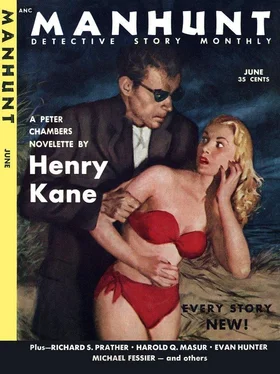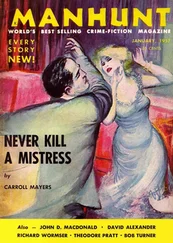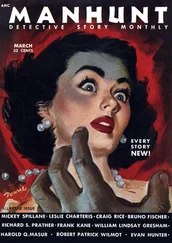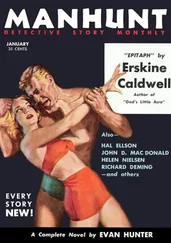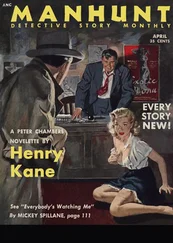Ричард Деминг - Manhunt. Volume 1, Number 6, June, 1953
Здесь есть возможность читать онлайн «Ричард Деминг - Manhunt. Volume 1, Number 6, June, 1953» весь текст электронной книги совершенно бесплатно (целиком полную версию без сокращений). В некоторых случаях можно слушать аудио, скачать через торрент в формате fb2 и присутствует краткое содержание. Город: New York, Год выпуска: 1953, Издательство: Flying Eagle Publications, Жанр: Детектив, на английском языке. Описание произведения, (предисловие) а так же отзывы посетителей доступны на портале библиотеки ЛибКат.
- Название:Manhunt. Volume 1, Number 6, June, 1953
- Автор:
- Издательство:Flying Eagle Publications
- Жанр:
- Год:1953
- Город:New York
- ISBN:нет данных
- Рейтинг книги:5 / 5. Голосов: 1
-
Избранное:Добавить в избранное
- Отзывы:
-
Ваша оценка:
- 100
- 1
- 2
- 3
- 4
- 5
Manhunt. Volume 1, Number 6, June, 1953: краткое содержание, описание и аннотация
Предлагаем к чтению аннотацию, описание, краткое содержание или предисловие (зависит от того, что написал сам автор книги «Manhunt. Volume 1, Number 6, June, 1953»). Если вы не нашли необходимую информацию о книге — напишите в комментариях, мы постараемся отыскать её.
Manhunt. Volume 1, Number 6, June, 1953 — читать онлайн бесплатно полную книгу (весь текст) целиком
Ниже представлен текст книги, разбитый по страницам. Система сохранения места последней прочитанной страницы, позволяет с удобством читать онлайн бесплатно книгу «Manhunt. Volume 1, Number 6, June, 1953», без необходимости каждый раз заново искать на чём Вы остановились. Поставьте закладку, и сможете в любой момент перейти на страницу, на которой закончили чтение.
Интервал:
Закладка:
Other residents of Green Valley did not know of this plan and they were of the opinion that immediate and drastic action should be taken to end what they considered to be an intolerable breach of public morals. There was some talk of forming a citizens’ committe to remove Claude forcibly from the community, but it is doubtful if anything would ever have been done about it if, one afternoon, Henry Rankins had not been found dead in a pool of blood on the floor of his barn. Jason Watters, the county tax assessor, who discovered the body, did not bother to investigate the cause of death. He ran from the barn and called for Claude and discovered that Claude was nowhere in sight and that, in addition to this Henry’s car was missing. Jason telephoned Sheriff Ben and then proceeded along the road to town, spreading the word that Henry Rankins had been murdered and that Claude Warren had disappeared.
By the time Sheriff Ben arrived at the farm, a dozen cars were parked in front of it and the barn was filled with men who milled in a circle about the body and disturbed or destroyed whatever evidence there might have been. This had not prevented them from forming opinions, however. They had picked up and handled and passed around various instruments, one of which they were certain had been used to crush Henry’s skull, and they were in disagreement only as to which was the true weapon. Even if Sheriff Ben had been an expert, which he wasn’t, he could not have gained much information from conditions as he found them. He ordered the others out of the barn and then telephoned Doc Doran, the coroner, to come get the body.
By the time Sheriff Ben came out of Henry’s house after making the phone call, the crowd in the yard had doubled and they were excitedly discussing a new aspect of the case. Laura Hannifer, it had been learned, had also disappeared. Her worried parents didn’t know her whereabouts, but they were afraid that she might have eloped with Claude Warren. This was all the crowd needed to know. They scattered to their cars and the search for Claude and Laura was on.
Sheriff Ben went back to his office and waited. It was not long before Lonnie Hearne, his deputy, assisted by Orry Quinn and another volunteer posseman, came in, dragging Claude and Laura with them. Claude had evidently resisted arrest and he was considerably banged up and bloody about the face. Laura, whose clothes were torn, was breathing fire and defiance and still struggling in the arms of the two possemen.
“Caught ’em with the goods,” Lonnie announced proudly. “They were in Henry’s car and Claude had a pocketful of money that he didn’t earn as no farm hand.”
While Lonnie prodded Claude with his revolver, the two kids told their story. They had discovered that Laura’s parents had been secretly planning to send her to California to live with relatives, and, aided and abetted by Henry, they had decided to get married. Henry, they claimed, had lent them his car and the money for the elopement and the last they had seen of him he was in good health. They had not known, they declared, that Henry was dead until Lonnie and the others arrested them.
“And that’s the truth, so help me,” said Claude.
“It’s a damn lie and, this time, nobody's going to help you,” said Lonnie, viciously jamming the revolver against Claude’s spine.
“Up until the present moment,” said Sheriff Ben, knocking the revolver out of Lonnie’s hand, “you’re neither judge, jury, nor executioner for this commonwealth, Lonnie. You, Orry, let go of that girl and all of you clear out. I’ll take over from now on.”
After the others had made a reluctant departure, Sheriff Ben turned to Claude.
“Maybe you’re telling the truth,” he said. “I don’t know. Anyway, I’m going to lock you up until we get a better idea of what the truth is.”
Following a struggle with Laura, who insisted on being locked up too, Sheriff Ben succeeded in placing Claude in a cell. Then he sat and talked with Laura until her parents arrived and, after a great deal of difficulty, persuaded her to go home with them.
At first there were only a dozen men in front of the jail. They stood around and talked angrily but without purpose. Orry was one of them. After awhile he detached himself from the group and went into the village where he found a cluster of citizens gathered in front of the hotel discussing the case. He shoved his way into the center of the cluster and soon dominated the conversation by boastfully telling of his part in the capture and subjugation of Claude Warren, the murderer.
“How do you know he’s a murderer?” someone asked. “Did he confess?”
“Well,” said Orry, hesitating a moment, “not in so many words, but he practically did.”
Then Orry went about the village and told his story to other groups of eager listeners, embellishing it as he went along. By the time he had reached the end of the main street he had dropped the word practically from his narrative. Claude, according to his story now, had actually confessed to having beaten Henry Rankins to death for his money. The news swept back up the street and presently even those who had heard Orry’s first version of the story, were convinced that Claude had admitted his guilt.
“And what’s more,” Orry said importantly to a new group of listeners, “they’re not going to let him get away with it. There’s talk of breaking into the jail and stringing him up.”
Soon word flashed through town and into the farming district that a crowd had gathered in front of the country jail for the purpose of lynching Claude Warren. This story in itself created the crowd which previously had not existed. Men, women and children flocked into the square facing the jail and waited expectantly for something to happen. Nothing happened. The crowd had no purpose or direction and they lacked leadership. Each individual member of the throng considered himself not a potential participant in whatever was about to take place, but merely a spectator to what the others were going to do.
An hour passed and it began to grow dark and the crowd grew more and more restless. They were in the mood of an audience that has paid out good money to see a show, the opening curtain of which has been delayed too long. If they had been in a theatre they would have stamped their feet and whistled. As it was they milled about and looked questioningly at one another and began to murmur, at first petulantly and then angrily. Finally, the shrill piping voice of a small boy rose above the murmur: “We want Claude Warren! ” Others eagerly picked up the cry and, as they began to roar in unison, they ceased to be individuals and became a mob.
Inside his office, Sheriff Ben sat at a desk with three loaded revolvers before him. He opened a box of shells and began to load a shotgun. Lonnie, the deputy, was nervously pacing the floor.
“You’re not going to be fool enough to resist them, are you, Ben?” he asked.
“Can you figure out anything else to do?” asked the sheriff.
“It’s crazy,” said Lonnie. “They’ll tear us to pieces. I ain’t going to risk my life for no lousy killer. That ain’t what I’m being paid for as a deputy.”
“And you’re not a deputy anymore,” said Sheriff Ben. He ripped the badge off Lonnie's shirt front, unlocked the door and shoved him out. “Now go howl with the rest of the jackals.”
He locked the door again and went back and sat at his desk. He listened to the growing roar from outside and he began to tremble and the palms of his hands were moist. In electing Ben Hodges sheriff, the citizens of Green Valley had not bestowed on him superhuman courage. Sheriff Ben was afraid.
The mob had now achieved purpose and direction and it was not long before they obtained leaders. The people of Green Valley had long looked to certain men for leadership in politics, civic enterprises, and church affairs. It was only natural that, in this current project, they looked to the same men for guidance. And those men, out of long habit, accepted the responsibility. Orders were given and eagerly obeyed and soon a heavy timber had been produced and was aimed as a battering ram at the door of the jail.
Читать дальшеИнтервал:
Закладка:
Похожие книги на «Manhunt. Volume 1, Number 6, June, 1953»
Представляем Вашему вниманию похожие книги на «Manhunt. Volume 1, Number 6, June, 1953» списком для выбора. Мы отобрали схожую по названию и смыслу литературу в надежде предоставить читателям больше вариантов отыскать новые, интересные, ещё непрочитанные произведения.
Обсуждение, отзывы о книге «Manhunt. Volume 1, Number 6, June, 1953» и просто собственные мнения читателей. Оставьте ваши комментарии, напишите, что Вы думаете о произведении, его смысле или главных героях. Укажите что конкретно понравилось, а что нет, и почему Вы так считаете.
